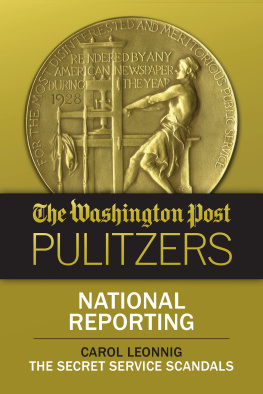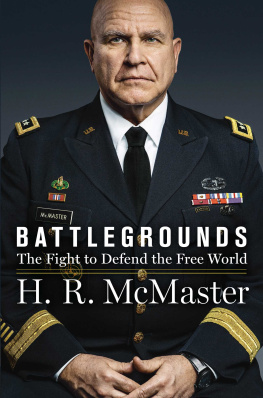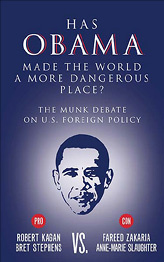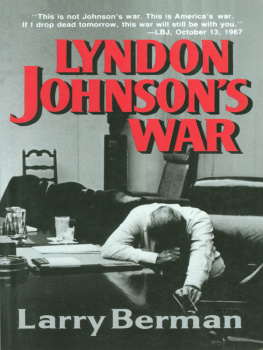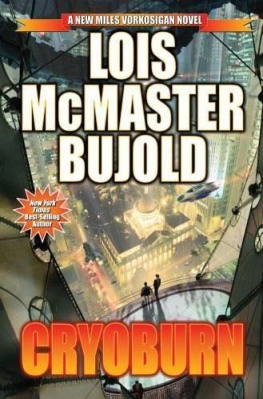Contents
The New Frontiersmen and the Old Guard
1961October 1962
Havana and Hanoi
October 1962November 1963
New War, New Leader
November 1963January 1964
Graduated Pressure
JanuaryMarch 1964
From Distrust to Deceit
MarchJuly 1964
Across the Threshold
JulyAugust 1964
Contriving Consensus
AugustSeptember 1964
Prophecies Rejected and the Path of Least Resistance
SeptemberNovember 1964
Planning for Failure
NovemberDecember 1964
A Fork in the Road
December 1964February 1965
The Foot in the Door
FebruaryMarch 1965
A Quicksand of Lies
MarchApril 1965
The Coach and His Team
AprilJune 1965
War without Direction
AprilJune 1965
Five Silent Men
July 1965
D espite scores of books on the subject, the why and how of direct U.S. intervention in the Vietnam War remains unclear. The war continues to capture the public interest in part because, looking back, its cost seems exorbitantand would seem so even if the United States had won. The war took the lives of fifty-eight thousand Americans and well over one million Vietnamese. It left Vietnam in ruins and consumed billions of American dollars, nearly wrecking the American economy. Vietnam divided American society and inflicted on the United States one of the greatest political traumas since the Civil War. Indeed, the wars legacies proved to be as profound as the war was traumatic. It led Americans to question the integrity of their government as never before. Thirty years later, after the end of the Cold War, the shadow of the American experience in Vietnam still hangs heavy over American foreign and military policy, and over American society.
It would be impossible for an Army lieutenant, obtaining his commission in 1984, not to be concerned with the experience of the Vietnam War. I thought that to better prepare myself to lead soldiers in combat it was important to learn from the experiences of others, and the most I wondered how and why Vietnam had become an American wara war in which men fought and died without a clear idea of how their actions and sacrifices were contributing to an end of the conflict. When I arrived at Chapel Hill, North Carolina, in 1992 to begin my graduate work in American history, I began to seek answers to those questions.
I discovered that the militarys role in Vietnam decision making was little understood and largely overlooked. That was not the role of the Joint Chiefs of Staff (JCS) during the escalation of the Vietnam War. It became clear to me that I would need to understand the role of the president, his principal civilian advisers, and the JCS in the decision-making process.
The timing was right. Recently declassified documents, newly opened manuscript collections, and the release of the official history of the JCS during the Vietnam War shed new light on the subject. I gained access to thousands of documents that had previously been unavailable to researchers and historians. Interviews with those close to the decision-making process, taped meetings and telephone conversations, and oral histories and memoirs of top civilian and military officials who served during this period placed the documentary record in the context of personalities and advisory relationships. The discoveries astonished me, and I felt compelled to share them with others.
Any interpretation of direct American intervention in the Vietnam War must address the question of responsibility for one of the greatest American foreign policy disasters of the twentieth century. Assessing blame for the disaster in Vietnam, however, is beside the point. Much more important is to determine how and why key decisions were made, decisions that involved the United States in a war that it could not win at a politically acceptable level of commitment.
1
The New Frontiersmen and the Old Guard
Allowing for reasonable exceptions and a wide latitude of variation, the typical New Frontiersman is about 46 years old, highly energetic, distinctly articulate and refreshingly idealistic. In short, he has much in common with the man the American people have chosen as their President.
M. B. S CHNAPPER, 1961
T he disaster of the Vietnam War would dominate Americas memory of a decade that began with great promise. In the 1960 presidential election, John F. Kennedy narrowly defeated Dwight Eisenhowers vice president, Richard Nixon. Despite a narrow margin of victory, the new president exuded confidence. His clarion call, Let us begin anew, evoked the prospect of a new era of prosperity and opportunity.would be lost in a place that, in 1960, was of little interest or significance to Americans.

A campaign issue that Kennedy had taken up with some vigor was that of the need for reform in national defense strategy and the management of the Department of Defense. Truman administration Defense Secretary Robert Lovett advised Kennedy that reform in the Pentagon would be painful but was long overdue. He told him that his defense secretary should be an analytical statistician who can tear out the overlap, the empire building. Lovett urged the president-elect to consider the forty-four-year-old president of the Ford Motor Company, Robert Strange McNamara, for the job.
When World War II began, Robert McNamara was serving on the business faculty at Harvard University, teaching the application of statistical analysis to management problems. Initially disqualified from military service because of his inability to pass an eye examination, he became a consultant to the War Department to develop statistical controls within the Army Air Corps supply system. After spending the first year of the war teaching at the Army Air Forces Statistical Control Officers School, McNamara requested an assignment to the Eighth Air Force in England. McNamara arrived in England in February 1943 and, after three weeks, sought a commission as a captain. The professor-turned-military-officer became part of a traveling statistical control group that analyzed maintenance, logistics, and operational problems in England, India, China, and the Pacific. McNamara often met resistance from military officers who discounted his new methods. A lieutenant colonel in 1945, he left the Army an ardent believer in the need for statistical management and control over military organizations.
After World War II, McNamara, with several of his Army Air Corps statistician colleagues, joined Ford. They were known collectively as the Whiz Kids, a term later associated with the young analysts McNamara brought with him to the Pentagon. At Ford, McNamara preferred the academic milieu of Ann Arbor to the corporate culture of suburban Detroit. His drive, ambition, and analytical talents led to his appointment, in November 1960, as the first company president who was not a member of the Ford family. One month later R. Sargent Shriver, John F. Kennedys brother-in-law, visited McNamara on behalf of the president-elect.
Among the qualities that Kennedy admired was self-assurance. During his second meeting with Kennedy, McNamara surprised the president-elect and his brother Robert with his assertiveness. He handed Jack Kennedy a contract stipulating that he be given free rein over appointments in the Department of Defense and not be expected to engage in purely social events. Kennedy read the document and passed it, unsigned, to his brother. McNamara seemed the man for the job. The Kennedy brothers swept McNamara out the front door of the brick Georgetown house and introduced the secretary of defense-designate to the bevy of reporters waiting outside in the freezing cold.


